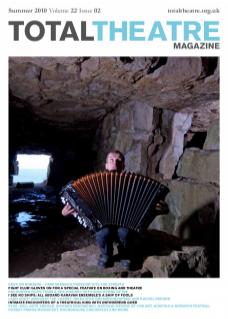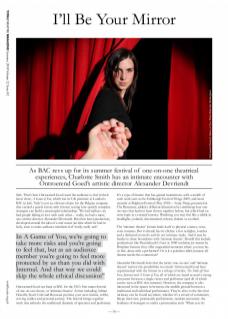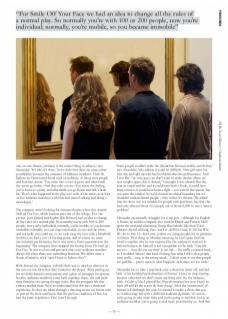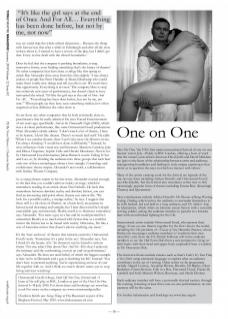Safe. That’s how Ontroerend Goed want the audience to feel in their latest show, A Game of You, which has its UK premiere at London’s BAC in July. ‘Safe’ is not an obvious choice for the Belgian company that created a gentle furore with Internal, testing how quickly complete strangers can build a meaningful relationship. ‘We had stalkers, we had people falling in love with each other… really, we had a mess,’ says artistic director Alexander Devriendt. But their latest production, developed around the idea of a real avatar (an idea which he had in bed), aims to make audience members feel ‘really, really safe’.
Ontroerend Goed are back at BAC for the UK’s first major festival of one-on-one shows, or ‘intimate theatre’. Artists including Adrian Howells, Stan’s Café and Rotozaza promise your own cinema, coffin, serving soldier and personal journey. The festival brings together work that rethinks the traditional dynamic of spectator and performer.
It’s a type of theatre that has gained momentum, with a wealth of such work seen at the Edinburgh Festival Fringe 2009, and more recently at Brighton Festival (May 2010) – Seeing Things, presented at The Basement, added a different dimension by combining four one-on-ones that had not been shown together before, but which had an eerie logic as a curated journey. Watching, you may feel like a rabbit in headlights, isolated, disorientated, reborn, shaken or soothed.
The ‘intimate theatre’ format lends itself to physical contact, trust, even romance. But it already has its clichés: a few tealights, touches and a darkened room do and do not intimacy make. And it may be harder to draw boundaries with ‘intimate theatre’. Should this include productions like Punchdrunk’s Faust or 1000 revolutions per moment by Periplum because they offer unguarded moments where you may be, or feel, alone with a performer? Or is it a pointless label, because all theatre needs this connection?
Alexander Devriendt feels that the terms ‘one-on-one’ and ‘intimate theatre’ narrow the possibilities too much. Ontroerend Goed have experimented with the format in a trilogy of works, The Smile off Your Face, Internal and A Game of You, all of which are based around a strong encounter between a single viewer and performer (and all of which can be seen at BAC this summer). However, the company is also interested in the spaces in between, the middle ground between a traditional and individual performance. They’re alive to the fact that intimacy can be found anywhere, whether it’s a crowd of commuters, Skype interview, promenade performance, random encounter, the kindness of strangers or under a proscenium arch. ‘When you do one-on-one theatre, intimacy is the easiest thing to achieve,’ says Alexander. ‘It’s like, it’s there.’ So he feels that there are many other possibilities between the extremes of audience numbers. Under the Influence by Ontroerend Goed used an audience of about sixty people and fourteen actors. ‘You came into a sort of party and afterwards the actors go home—but they take you too. You know the feeling, you’ve been to a party and afterwards you go home and talk a little bit. That’s what happened in the play too: each of the actors took four or five audience members with him and started talking and doing a monologue.’
The company wasn’t looking for intimate theatre when they started Smile off Your Face, which became part one of the trilogy. ‘For one project, Joeri [Smet] and Sophie [De Somere] had an idea to change all the rules of a normal play. So normally you’re with 100 or 200 people, now you’re individual; normally, you’re mobile, so you became immobile; normally, you can clap your hands, so we tied the wrists and normally you could see, so we took away the eyes with a blindfold. And then we had a sort of starting-point, and of course we came into intimate performance, but it was more a form experiment in the beginning.’ The company then stripped the fiction from The Smile off Your Face. ‘It was so close and personal that every audience member always felt when there was something fictitious. We didn’t want a frame of mind to click “now I have to believe that”.’
With Internal, the company still felt there was so much to discover in the one-on-one form that they wanted to develop it. After pairing up for no-holds-barred conversations and a glass of schnapps in separate booths, audience members come back together, share, test and push their fantasies in a group therapy scene. But the company felt that visitors needed more ‘keys’ to understand that this was a theatrical experience. So they are taken through a dressing room, see letters sent as part of the show and know that the previous audience of five has had the same experience. This wasn’t enough.
‘Some people couldn’t make the distinction between reality and fiction,’ says Alexander, who admits it could be difficult. ‘One girl came the first day and split up with her boyfriend after the performance. And I was like, “no way, guys, we don’t want to make theatre where we tear couples apart, this is absurd,” I thought it was absurd. But she sent an email and she said it could have been a book, it could have been a movie, it could have been a fight – you weren’t the reason, but you were the catalyst. So we’d crossed an ethical boundary but we shouldn’t underestimate people – they realise it’s theatre.’ He added that the show was not suitable for people with psychosis, but that this had only affected about five people out of about 8,000 so was a ‘minor problem’.
Alexander occasionally struggles for le mot juste – although his English is fluent, he and the company also work in Dutch and French. He’d spent the weekend rehearsing Teenage Riot (which, like their Total Theatre Award-winning Once And For All We’re Going To Tell You Who We Are So Shut Up And Listen, centres on young people) for its premiere in Ghent. First thing on Monday morning, he can’t quite find the word to explain why he was surprised by the audience’s reaction to Internal, because he himself is less susceptible to the trick. ‘I myself am too … how do you say that? Je suis trop… I’m really a control freak, so I wouldn’t believe that kind of thing, but what I felt is that people were really… easy is the wrong word… I don’t want to say that people are gullible… pretty open to what happens. Ach, man, it’s too early.’
Alexander has to take a step back once a show has taken off, and did ‘only’ a few hundred performances of Internal. ‘I have to stop touring because otherwise we don’t create anything new. So, for instance, with A Game of You, I played like 50 performances but now I have to back off and let the actors do their thing.’ After the ‘commotion’ of Internal in Edinburgh last year, he wanted to make a show that was as ‘confronting’ but with a different audience dynamic. ‘As actors, we’re going to take more risks and you’re going to feel that, but as an audience member you’re going to feel more protected by us. And that way we could skip the whole ethical discussion… Because the thing with Internal was that after a while in Edinburgh and after all the texts written about it, I wanted to have a review of the play, but I didn’t get that. Every review dealt with the ethical boundaries.’
Does he feel that the company is pushing boundaries, trying innovative forms, even finding something that’s the future of theatre? No other companies that have done a trilogy like this spring to mind. But Alexander shies away from this idea slightly. ‘I was always jealous of people like Peter Handke or Marcel Duchamp who could make these totally new things and tell you this is art. We won’t have that opportunity. Everything is art now.’ The company likes to step into relatively new areas of performance, but doesn’t claim to have reinvented the wheel. ‘It’s like the girl says at the end of Once And For All… “Everything has been done before, but not by me, not now.”’ When people say they have seen something similar, he’s often surprised at how different the other show is.
So are there any other companies that he feels artistically close to, practitioners that he really admires? He cites Forced Entertainment of ten years ago, specifically And on the Thousandth Night (2000), which was a six-hour performance, like some Ontroerend Goed productions. Then Alexander calmly admits: ‘I don’t watch a lot of theatre, I have to be honest, I don’t like theatre. There’s so much bad stuff.’ He adds: ‘When I see another theatre show I can’t take away the director in me, I’m always thinking “I would have done it differently.”’ Instead, he cites influences from visual arts and literature: Maurizio Cattelan, Jake and Dinos Chapman, Sophie Calle and Haruki Murakami. Hard to Get by Ontroerend Goed dramatises Julian Barnes’s novels Talking It Over and Love, etc, by dividing the audience into three groups that each hear only two of three monologues about a love triangle. Cosmology and evolutionary theory inspire Alexander’s next work, a collaboration with Sydney Theatre Company.
As a young theatre-maker in his late teens, Alexander reacted strongly to the idea that you couldn’t achieve reality on stage, which he remembers reading in an article about Tim Etchells. He feels that somewhere between absolute reality and absolute fiction, you can find an interesting mid-point where theatre can mirror life. ‘We look for a possible reality, a strange reality,’ he says. I suggest that there still is a fair dose of illusion: on a basic level, my partner in Internal acted charming and straight, but I later discovered he’s deeply unavailable (gay and married). ‘Reality itself is so fictitious sometimes,’ says Alexander. ‘You meet a guy in a bar and he could pretend he’s unmarried. Reality is so much mixed with fiction that as a truthful mirror the fiction has to be mixed with reality. Otherwise, I’m like a sort of lonesome mirror that doesn’t mirror anything any more.’
It’s the ‘here and now’ of theatre that remains central to Ontroerend Goed’s work. ‘Sometimes it’s a pain in the ass,’ Alexander says, ‘but I think it’s the beauty of it.’ So closeness can be found in various forms. ‘For me, what I like about Once And For All is that I achieved the intimacy and the confronting, even in an end-on performance,’ says Alexander. He does not need belief, of which the biggest example is that ‘we’re in Denmark and a guy is doubting his life’. Instead: ‘You don’t have to pretend anything. You’re experiencing an hour of your life together with us. And I think too much theatre wants you to stop living and start watching.’
Ontroerend Goed’s trilogy, Smile Off Your Face, Internal and A Game of You will play at BAC, London as part of the One-On-One festival 6–18 July 2010. For show dates and bookings see www.bac. co.uk For more on the company see www.ontroerendgoed.be
Charlotte Smith saw Seeing Things at The Basement as part of the Brighton Festival, May 2010. www.thebasement.uk.com
One on One
One-On-One ‘the UK’s first major international festival of one-on-one theatre’ runs 6 July –18 July at BAC London, offering a feast of work that the venue’s joint artistic directors David Jubb and David Micklem say ‘gets to the heart of the relationship between artist and audience, transgressing boundaries and leading to truly unique experiences that invite us to question the ways in which we interact with others.’
‘Many of the artists creating work for the festival are legends of the one-on-one form including Adrian Howells and Ontroerend Goed,’ says David Jubb, ‘but the festival also introduces artists new to this increasingly popular form of theatre including Emma Rice (Kneehigh Theatre) and Quarantine’.
New commissions include Adrian Howell’s The Pleasure of Being: Washing, Feeding, Holding, which invites the audience to surrender themselves to be fully bathed, fed and held in a long embrace; and The Soldier’s Song by Quarantine, which offers an intimate screen liaison with a currently serving solider, asking the audience member to partake in a karaoke duet with an individual fighting for the UK.
International artists include Ontroerend Goed, who present their trilogy of one-on-one theatre together for the first time in the world, including the UK premiere of A Game of You; Hanneke Paauwe, whose Rendez-vous encourages audience members to ‘confront their own mortality’; and, from the US, Patrick Killoran will invite audience members to see the Old Town Hall from a new perspective: lying on their backs with their head and upper body suspended from a window in The Observation Deck.
The festival will also include classics such as Stan’s Cafe’s It’s Your Film, a ‘live film’ using cinematic language to explore what an audience contributes in the act of viewing. Other artists in the programme include Abigail Conway, Ansuman Biswas, Breathe, Ed Rapley, Eitan Buchalter, Emma Benson, Folk in a Box, Fractured Cloud, Franko B, Lundahl and Seitl, Melanie Wilson, Rotozaza, and Sheila Ghelani.
Each audience member will have a personally charted journey through the evening, featuring at least three one-on-one performances: no two journeys will be the same.
For further information and bookings see www.bac.org.uk



